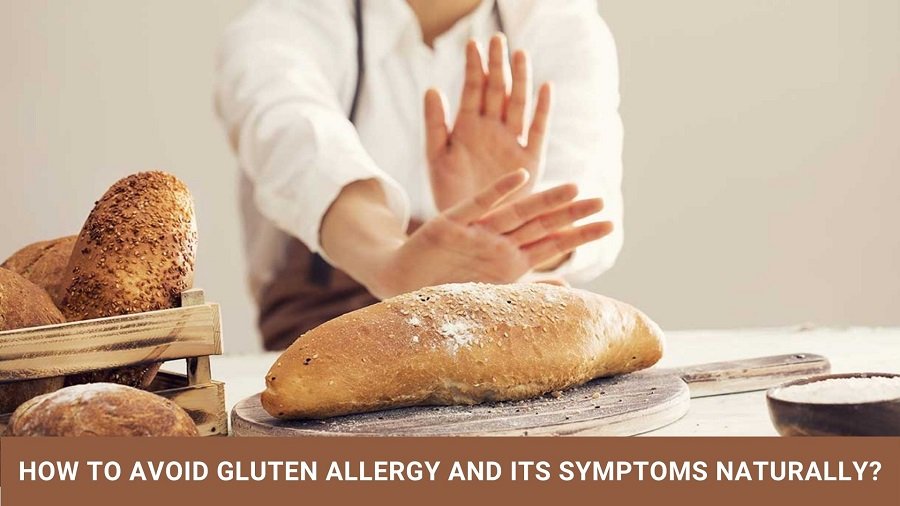Overview
Gluten is one of the natural proteins found in wheat. Sometimes the intake of wheat or wheat products can trigger reactions in the body. This primarily happens due to the body’s inability to digest gluten. The body begins to produce antibodies against this naturally occurring protein in wheat and that is when the symptoms of gluten allergy begin to show.
Gluten allergy is often confused with Celiac Disease which is not the case as these two are different conditions. Unlike gluten allergy, Celiac Disease causes an abnormal immune system reaction, which is generally long-term in nature.
In this article, we shall discuss various tips as per Ayurveda to avoid gluten allergy and its symptoms naturally.
What are the Causes of Gluten Allergy?
As mentioned above, gluten allergy is the outcome of the body’s inability to digest gluten on the consumption of wheat or its products. It begins to show allergic signs and symptoms which may appear within a few hours of wheat consumption.
Let us take a look at the signs and symptoms of Gluten Allergy.
What are the Symptoms of Gluten Allergy?
- Diarrhea or constipation
- Nausea or vomiting
- Headache
- Nasal congestion
- Bloating
- Constipation
- Abdominal cramps.
- Difficulty in breathing
- Rashes on the skin
- Itching and irritation around the rash
- Wheezing
- Swelling around the mouth and throat
- Hives
- Teary and itchy eyes.
Anaphylaxis may also develop as a result of extreme gluten allergy. Therefore, immediate medical assistance must be taken if a person who is allergic to gluten begins to experience any of these symptoms.
Ayurvedic Tips to Avoid Gluten Allergy and its Symptoms Naturally
Ayurvedic tips involve certain precautions, home remedies, dietary and lifestyle modifications to avoid gluten allergy and its symptoms naturally. Let us take a look at each one of them.
Precautions
Foods to Avoid
To prevent the contraction of a gluten allergy certain foods, need to be avoided. Wheat, Barley, and Rye primarily contain gluten. Foods that may contain these three grains include:
- Baked products such as cookies, biscuits, bread, muffins, croissants, pastries, cakes, etc.
- Pasta
- Products that contain semolina
- Couscous
- Beers
- Cereals
- Sauces
- Seasonings
- Soups
- Canned foods
- Candies
- Gravies
- French fries
- Croutons
- Hotdogs
Foods that are Gluten Free
- Vegetables
- Fruits
- Rice
- Quinoa
- Potato
- Oats
- Beans
- Pulses
- Poultry and meat
- Dairy products
Lifestyle and Dietary Modifications
Gluten-Free Diet
Following a gluten-free diet is one of the most common and popular options that people follow when allergic to gluten. This diet sure does help in managing the signs and symptoms of gluten allergy, but it sometimes may cease to provide the nutrition required for the body. It is of extreme importance to be careful while following a gluten-free diet that special attention is given to substitute foods in a manner that the nutritive aspect is not compromised.
For this purpose, you can contact our Medical and Dietary experts at IAFA® who can help you to plan and follow a gluten-free diet that helps you to manage the symptoms of your allergy while maintaining taking care of your body’s nutrition.
Grains or flours that can be included in a gluten-free diet include:
- Quinoa
- Millet
- Sorghum
- Soy
- Rice
- Wild rice
- Corn
- Buckwheat
- Arrowroot
- Amarnath
- Tapioca
- Teff
- Flax
- Rice, soy, potato, corn flours
Besides following a gluten-free diet one is also required to be cautious and take a few extra steps that might help in avoiding gluten allergy. These steps include:
- Always be extra cautious while dining in restaurants where you highlight the server about your gluten allergy.
- Always be careful of what you eat while you dine away from home or while traveling.
- Carry gluten-free snacks and options when traveling to avoid the chances of buying foods that may contain traces of gluten.
- Thoroughly read the ingredients of your grocery and packaged food purchases.
- In general, avoid buying or consuming foods that are not labeled as gluten-free.
- Certain medications may also consist of gluten as a binding agent. Be sure to cross-check with your pharmacist or doctor before consuming medicines.
Conclusion
Gluten allergy can be managed and avoided if correct measures and precautions are taken. To get the best advice for avoiding or treating Gluten Allergy and its symptoms naturally, you can consult our Experienced Ayurvedic Doctor at IAFA®, as they can help you to make your gluten-free journey easy and enjoyable by suggesting ayurvedic treatment measures and diet patterns that support a gluten-free lifestyle and also provide the right nutrition that is required for a healthy body.








